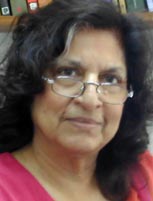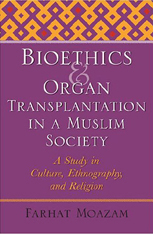 Medicine,
Culture and Religion Medicine,
Culture and Religion
Live Kidney Transplantation in Pakistan
A free public lecture and book signing by Dr. Farhat
Moazam
Oct. 24, 2007 - noon
Monsanto Auditorium, Bond Life Sciences Center
University of Missouri-Columbia
[See Flier]
Moazam is the founding chair and professor at the Centre of Biomedical
Ethics and Culture at Sindh Institute of Urology and Transplantation
in Karachi, Pakistan. A pediatric surgeon trained in the United States
and Pakistan, Moazam was founding chair and professor of the Department
of Surgery and Associate Dean of Postgraduate Education at the Aga
Khan University Medical College in Karachi. She also is a fellow with
the Institute of Practical Ethics and a visiting professor at the Centre
for Humanism in Medicine at University of Virginia, where she earned
an M.A. in Bioethics.
A graduate of Dow Medical College in Karachi, Moazam completed her training
and certification in general and pediatric surgery in the United States.
She was a faculty member in the departments of surgery and pediatrics
at University of Florida for several years, later returning to Pakistan.
In 2000, Moazam returned to the U.S. to pursue a doctorate in religious
studies at University of Virginia, with a focus on Islam and cross-cultural
ethics.
Moazam works with the World Health Organization and has spoken internationally
on research ethics, bioethics education, transplantation ethics, the
transnational organ trade and international guidelines for tissue and
organ transplantation.
About the book
 Moazam's
book, "Bioethics and Organ Transplantation,"
is an ethnographic study of live, related kidney donation in Pakistan,
based on participant-observer research conducted at a public hospital.
The narrative is both a description of renal transplant cases and the
cultural, ethical and family conflicts that accompany them, and an object
lesson in comparative bioethics. Moazam's
book, "Bioethics and Organ Transplantation,"
is an ethnographic study of live, related kidney donation in Pakistan,
based on participant-observer research conducted at a public hospital.
The narrative is both a description of renal transplant cases and the
cultural, ethical and family conflicts that accompany them, and an object
lesson in comparative bioethics.
"An important contribution to cross-cultural bioethics. (This)
rich ethnographic study of living kidney donation in Pakistan pays particular
attention to who is asked to donate and whose donation is accepted, to
the cultural and religious context of professional, familial, and individual
decision-making, and to gender roles. … Enthusiastically recommended
as a model of ethnographic bioethics."
- James F. Childress, director of the Institute for Practical Ethics
and Public Life, University of Virginia
"Offering a unique contribution to the literature on interpretations
of organ donation within Islam, Moazam deftly exposes a diversity of
views, sketching the tensions between fatawa which prescribe both duties
to save human life, and duties to respect the sacredness of the body." -
American Journal of Transplantation
"(The book) is more than an account of comparative medical ethics.
It is an insider's story of how modern medicine can be made to work successfully
in traditional societies where the demands of religion and extended families
are central."
- New Scientist
A discussion and book signing follows the lecture, which is free and
open to the public.
Monsanto
Auditorium, Bond Life Sciences Center
 Sponsored
by the MU Center on Religion & the Professions. For more information,
call (573) 882-2770 or e-mail whiteab@missouri.edu. Sponsored
by the MU Center on Religion & the Professions. For more information,
call (573) 882-2770 or e-mail whiteab@missouri.edu.
|